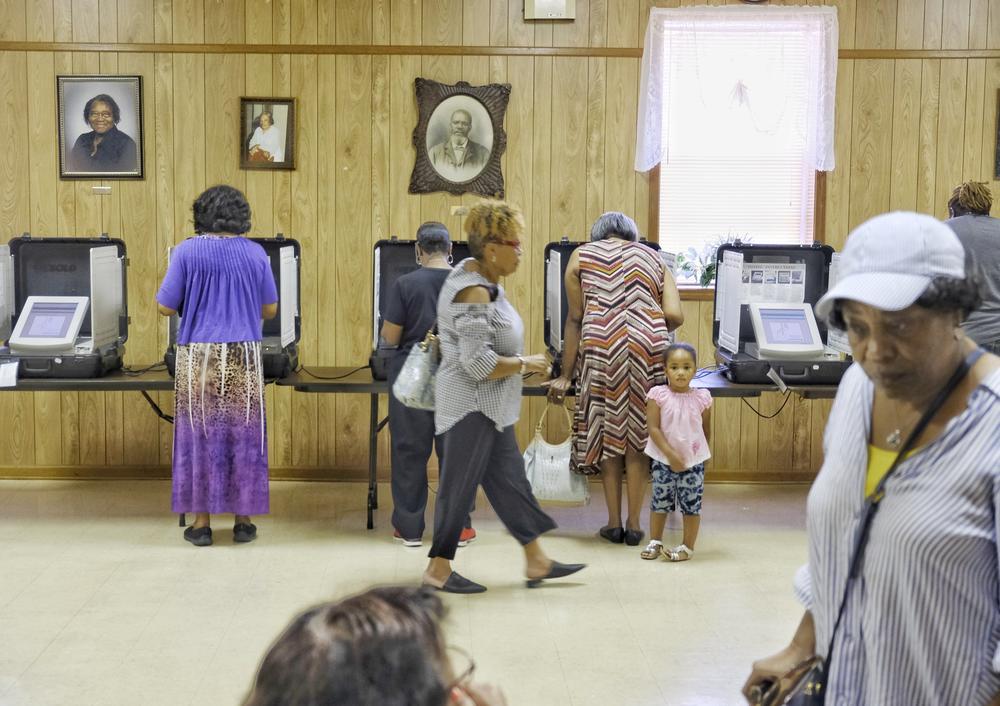Section Branding
Header Content
Judge Will Decide Fate Of Georgia’s ‘Too Old And Archaic’ Voting Machines For Fall Elections
Primary Content
A federal judge who said Georgia officials allowed its election system to “grow way too old and archaic” will soon decide if hundreds of county and municipal elections in 2019 must be conducted on hand-marked paper ballots.
After hearing two long days of testimony, U.S. District Court Judge Amy Totenberg expressed concern about balancing security issues with the outdated direct-recording electronic voting machines with the state’s existing planned transition to touchscreen ballot-marking devices with a paper ballot component by next year.
A group of election integrity advocates and Georgia voters filed the lawsuit in 2017 and are seeking a preliminary injunction to move local elections this fall to an interim election system where voters use hand-marked paper ballots, alleging the DRE machines in use since 2002 are not secure and vulnerable to hacking.
RELATED: How Does Georgia's Voting System Work?
“You are the only one left, you are the last resort,” David Cross, a lawyer representing a group of Georgia voters, told the judge.
“Georgia is wasting its citizens’ Constitutional right to vote,” argued Bruce Brown, representing the Coalition for Good Governance and another group of voters.
Lawyers for the state and Fulton County say that switching to hand-marked paper ballots would strain city and county budgets, create voter confusion and disrupt the state’s procurement process for implementing a new ballot-marking system in time for the March 24 presidential primaries.
“In 2019, it’s too late to enter an injunction,” Fulton County lawyer Kaye Burwell told the court during closing arguments.
RELATED: Here's What Vendors Say It Would Cost To Replace Georgia's Voting System
The first day of the hearing focused heavily on what the secretary of state’s office is – and is not – doing in the arena of cybersecurity and elections.
Lawyers for the plaintiffs grilled state officials and the head of a cybersecurity firm hired to conduct risk assessments for the secretary of state’s office in 2017 and 2018 about security practices and safeguards implemented on Georgia’s elections infrastructure.
That firm, Fortalice Solutions, found a number of risks with the office’s cybersecurity practices in 2017, and several of them were not yet remediated in Nov. 2018. Other than a specific analysis of a vendor involved with the state’s voter registration system, the assessments focused on non-elections aspects of the secretary of state’s infrastructure.
MORE: Secretary Of State Raffensperger: 'I Want To Get The Elections Process Right'
The plaintiffs’ lawyers argued that was a sign the state did not take security as seriously as it needed to, but chief information officer for the secretary of state’s office Merritt Beaver said that keeping systems secure was an ongoing process and his office was continuing to make progress.
Indeed, Judge Totenberg noted that the state had come a long way since a hearing last year where she denied a similar motion to switch elections systems to hand-marked paper ballots and said officials “buried their heads in the sand,” pointing now to the months-long process of SAFE Commission meetings, the legislative process and now procurement for new machines.
READ: Judge Denies Request For Paper Ballots In Georgia's 2018 Election
But she also said if the state was more forthright a year ago, the situation could be very different.
In asking the court to scrap Georgia’s existing DREs, the plaintiffs’ lawyers brought out several Georgia voters to detail troubles at the polls, elections officials from other states with experience switching to hand-marked paper ballots and computer science experts who highlighted vulnerabilities with the current system.
Amber McReynolds, executive director of the National Vote at Home Institute and former elections director for the city and county of Denver in Colorado, was one of those who shared her experiences transitioning elections from touchscreen DREs to hand-marked paper ballots.
IN-DEPTH: A Look At Machines That Could Replace Georgia's Aging Voting System
But four county elections directors that testified Friday said places like Denver had more time, planning and funding to transition to hand-marked paper ballots than what the court could potentially ask them to do.
Jennifer Doran runs elections for Morgan County just south of Athens. She told the court her election budget was about $30,000 in total, and it would cost several thousand more dollars if she had to purchase enough ballot scanners to run three municipal elections this fall.
One set of plaintiffs wants the court to force Georgia to replace its touchscreen machines with hand-marked paper ballots, keeping its existing election management system and tabulating votes with scanners that are already in place for absentee and provisional ballots.
The other plaintiffs want the state to use hand-marked paper ballots with the new optical scanners and election management system that will be announced soon instead of the current DREs.
Judge Totenberg called the task ahead of her “very daunting,” and said that while the integrity of elections systems must be front and center, she was wary of chaos and running amok in the state’s election process.
“These are very difficult issues,” she said. “I’m going to wrestle with them the best that I can, but these are not simple issues.”
A ruling could come as early as next week, around the same time the state could announce the new voting machine vendor contract.
Help GPB News cover voting and voting machines in Georgia by filling out this survey.


